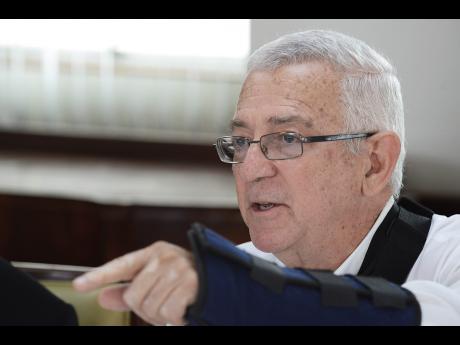Jamaica misses 5-CSEC target
Despite spending more than $755 billion through the national Budget on education since 2005, Jamaica will not meet the target set out in the national transformation road map of having 60 per cent of students sitting the Caribbean Secondary Education Certificate (CSEC) examinations attaining five subjects, including mathematics and English, by 2015.
Data provided by the Ministry of Education indicate that only 38.6 per cent of the grade 11 cohort who sat CSEC in 2014 attained five subjects, including mathematics and English.
Some 34 per cent of age-level high-school students were not recommended to do CSEC examinations last year.
The grade 11 cohort averages 40,000 young people each year.
The National Youth Policy 2015-2030 Green Paper, which was recently tabled in the House of Representatives by youth minister Lisa Hanna, noted that for the five years, 2010-2014, an average of 17 per cent of students in the grade 11 cohort passed five CSEC subjects, including mathematics and English language.
It argued that with less than approximately one-third of students passing five subjects, including mathematics or English language or both, it is unlikely that the task force target would be met.
"The data imply that almost two-thirds of the cohort failed to gain sufficient qualifications to move on to any post-secondary academic institution, which also compromises their ability to obtain sustainable employment," the Green Paper said.
But speaking at an Editors' Forum held at The Gleaner's North Street offices last Wednesday, education minister Ronald Thwaites said using CSEC passes to measure student achievement is ill-advised.
"Whatever the wisdom of the early transformation report, the measure of our students cannot be measured by CSEC passes," said Thwaites, adding that attention should also be placed on City and Guilds and National Council on Technical and Vocational Education and Training certification.
DIFFERENT APTITUDES
"We have to play to the different aptitudes of our students, and if you look at them in aggregate, they are reasonable," Thwaites said, while conceding that "they are not where they should be".
This year, 6,358 students registered for Level One National Vocational Qualifications (NVQ) certification, 21.5 per cent of whom earned certification. At Level Two, 6.8 per cent of the 180 students who registered got certification.
Some 71 per cent of the 4,579 who sat City and Guilds mathematics passed, and 60.6 per cent of those who sat the reading and writing component were successful.
Thwaites said two of the major deficits of the current high school education system are the shift system and the fact that students have to travel very far, in some instances, to school. Noting that steps are being taken to address both areas, he said it would go a far way in improving student performance.
Jamaica is spending $81 billion on education this year - 12.5 per cent of the national Budget, which is $640 billion. The total spend on education from the Budget in 2005 was $38 billion.
When asked whether Jamaicans are getting the best returns for the amount being spent on education, the minister said: "Absolutely not!"
He said "anywhere up to 20 per cent, and in some cases more, was being ineffectively spent" by the education ministry when he went there in 2012.
Like Thwaites, experienced educator Elaine Foster-Allen, permanent secretary in the education ministry, said "we need to be fair to ourselves as a country" in assessing the extent to which taxpayers are getting the best returns for the investment in education.
"If you take the number of children who have steadily been passing the Grade 4 Literacy Test, the Grade Six Achievement Test, and the CSEC over the past 10 years, it has been trending up consistently," Foster-Allen said.
She said as part of the reform of the education system, the aim is to ensure that students have high-quality experiences in the classroom at the secondary level "so that those children can come out with a clutch of subjects, whether it is CSEC, NVQ, or City and Guilds".
"They would then have the basis on which to build, going either into entrepreneurship, tertiary education, or the world of work," Foster-Allen said.
STEADFAST AND SURE
"The changes that we are experiencing are probably slower than we would like to see, but I think they are steadfast and I think they are sure," she added.
The population of students sitting CSEC and attaining five subjects, including mathematics and English, has increased from 30.4 per cent in 2008 to 38.6 in 2014.
Esther Tyson, a retired principal of Ardenne High School, St Andrew, said there is a serious shortfall in the system.
"I think there should be more synergy between the levels of education in the country so that we ensure that we are preparing our students for the market or preparing our students to develop their own way of earning a living," Tyson said.
She said while entrepreneurship, for example, has been introduced in some schools, there remains a disconnect between the job market and the educational level of people.
Thwaites, meanwhile, said that by 2017, new government policies would seek to put an end to the days when children left school in a celebratory manner even though they were not ready for either the job market or higher education.
"You won't put on any cap and gown in any high school unless you have taken an exam and got some level of certification in English, math, and at least one marketable skill," Thwaites said.
Based on the data provided by the ministry's transformation unit, only 29 per cent of the population has enrolled in tertiary and post-secondary education, way below the minimum 50 per cent set for 2015.
Additionally, 58 per cent of children are achieving mastery at Grade 4 Numeracy Test, which is below the 75 per cent target that has been set.



